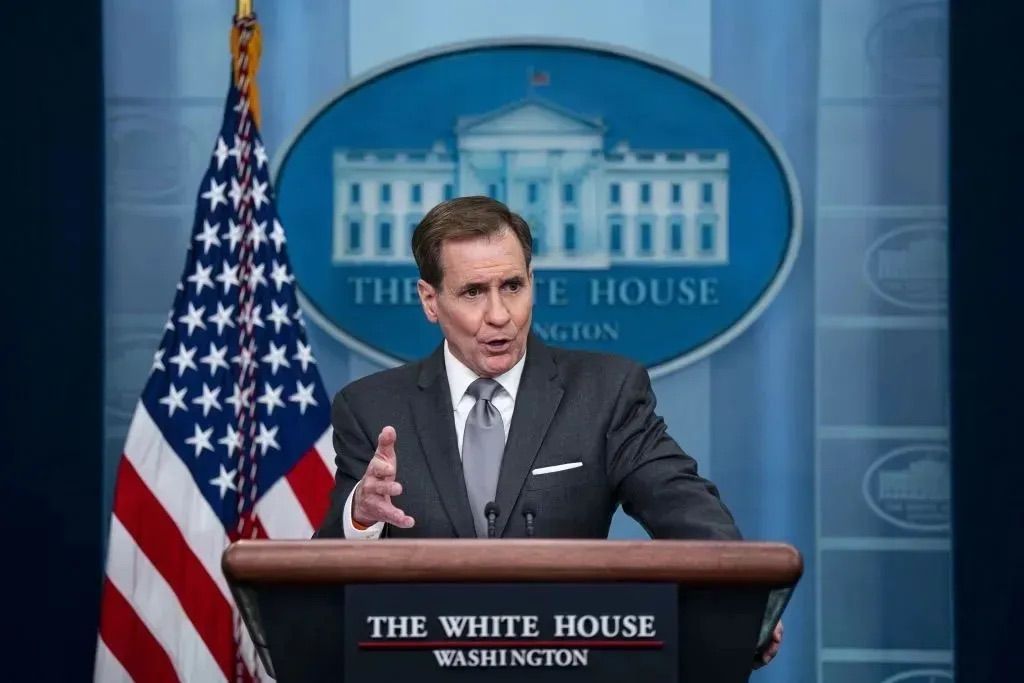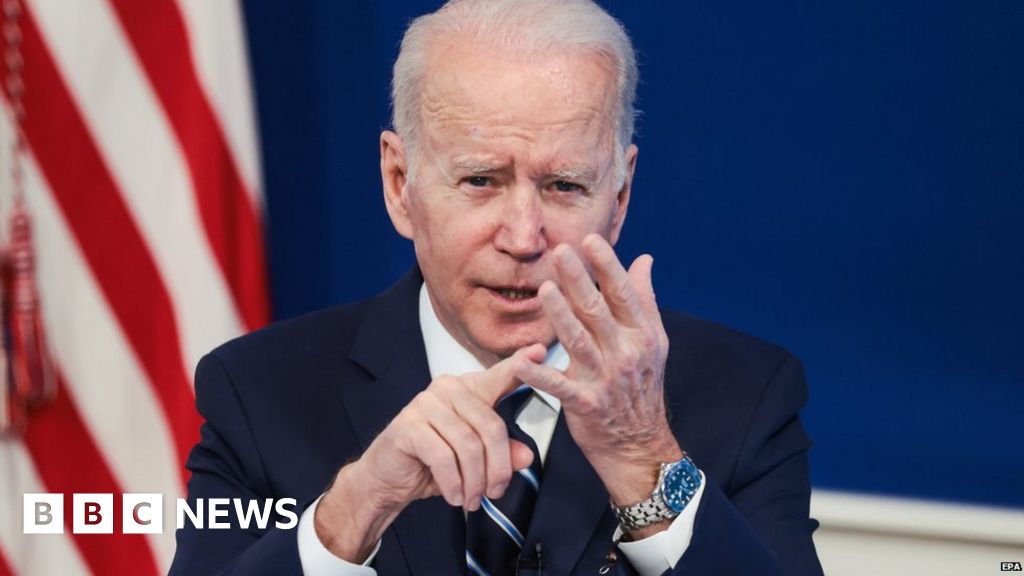:quality(70)/cloudfront-us-east-1.images.arcpublishing.com/archetype/NK2ZPP7NJBAXHLDRNFR6CB5FHQ.jpg)
BRUSSELS — In late May, the Biden administration announced a major policy change: Washington would now let Ukrainian forces fire American-provided weapons into Russia — though only around one region in the northeast.
This had long been a bright red line in the administration’s support for Kyiv, fearing an expanded war.
It took only a few days for Ukraine to say it wasn’t enough.
“Is that sufficient? No,” said President Volodymyr Zelenskyy, speaking at a news conference in Singapore hours after meeting with U.S. Defense Secretary Lloyd Austin.
The comment was a microcosm of a much longer-term challenge for Washington. In an effort to avoid escalation, the administration has withheld certain weapons requested by Ukraine, only to later change course. The result is an ever-shifting policy that often leaves Kyiv dissatisfied — why accept one change to the rules when pushing for another could loosen them more?
The latest and perhaps most significant example of this situation has been cross-border strikes. The limited authority the White House gave Ukraine to fire into Russia is already expanding. And if this continues, analysts say, it may make a real impact in the fight.
“It could really change the war,” said George Barros, who leads the Russia and geospatial intelligence teams at the Institute for the Study of War, a public policy research outfit.
Two weeks after Zelenskyy’s comments, a senior U.S. official defense official said the policy may just be moving in that direction. On the sidelines of a June meeting at NATO headquarters in Brussels, the official listed examples of things Ukraine has wanted that America has changed its mind on: fighter jets, long-range missiles, shooting into Russia.
“If you look back over the course of a conflict, you can find a number of areas where we were reluctant to do something and then we did it,” the official said, speaking on the condition of anonymity, per Pentagon policy. “So never say never.”
The path to the late-May policy change began weeks before Zelenskyy’s comments in Singapore.
Earlier in May, Russia launched a new offensive near Kharkiv, Ukraine’s second-largest city. Unlike other major urban areas in the country, Kharkiv sits near the Russian border — about 20 miles away. Largely due to limitations on how Ukraine could use Western-provided weapons, Russia was able to fire from its side of the border without significant retaliation.
“You could just look at the maps … showing the Russians amassing just across the border and using that to strike into Ukraine,” the U.S. defense official said.
Ukraine asked for the ability to fire into Russia, which Washington granted after some European partners publicly supported the request. But it would be limited: Ukraine could fire U.S. weapons — like the High Mobility Artillery Rocket System, with a range of nearly 50 miles — across the border to defend itself around Kharkiv. It still couldn’t fire long-range American weapons — such as the ATACMS missile with a reach of about 186 miles — at targets deeper into Russia.
Within weeks U.S. officials were crediting the change, in part, to a more stable front line. When Austin visited NATO headquarters in June, members of the U.S. delegation called the mood “upbeat.”
“What I see is a slowing of the Russian’s advance and a stabilizing of that particular piece of the front,” Austin said.
Some analysts were skeptical of that account.
Michael Kofman, who studies the Ukraine war at the Carnegie Endowment for International Peace think tank, said that by the time America’s policy changed, Russia had already started to lose momentum.
“The Russian offensive had already culminated before the policy change went into effect,” he said.
That isn’t to say the approval to fire into Russia was useless. The point is to create dilemmas, according to Barros. Under the current policy Russian forces will have to spread farther apart, lest they become easy targets. That will make it harder to launch new offensives.
But that’s a limited benefit, Barros told Defense News.
“It’s not going to make a massive difference in the long run, as it stands,” he said.
Hence, a bevy of officials in the U.S. and abroad have pushed to end the remaining restrictions. Among this group is NATO’s secretary general.
Shortly before the June meeting in Brussels, Jens Stoltenberg stepped into the headquarters lobby to speak with reporters. On strikes into Russia, he made two points: Because the border and the front lines are so close near Kharkiv, Ukraine would struggle to defend itself if it couldn’t fire into Russia. And the burden shouldn’t be on Ukraine to avoid escalation.
“Ukraine has the right to strike military targets on Russian territory — part of the right to self-defense — and we have the right to support them in defending themselves,” he said.
Members of Congress, prominent Democrats among them, have urged the Biden administration to loosen restrictions for Ukraine. Many European partners have joined them.
“Russia is organizing the attacks from Russian territory, and we put restrictions on Ukraine,” Lithuanian Defence Minister Laurynas Kasčiūnas said in an interview with Defense News. “It’s nonsense.”
But based on several recent statements from American officials, it’s unclear what those restrictions are.
When asked to clarify America’s policy on strikes into Russia, the U.S. defense official speaking in Brussels paused and opened a binder of prepared notes. Reading them, the official listed several of the talking points the administration has used when discussing the policy: “limited,” “military targets,” “just across the border.”
“That’s not much more detail,” the official said, as reporters in the room laughed.
In a news conference later that day, Austin answered questions about the policy, framing it around Ukraine’s northeast. “The ability to conduct counterfire in this close fight in Kharkiv region is what this is all about,” he said.
But several days later in an interview with PBS, U.S. national security adviser Jake Sullivan said the permission to strike “extends to anywhere that Russian forces are coming across the border from the Russian side to the Ukrainian side to try to take additional territory.”
“This is not about geography,” Sullivan added. “It’s about common sense.”
From Ukraine’s perspective, the policy is “quite clear,” according to Dmytro Klimenkov, the deputy minister of defense for procurement. He declined to comment on whether the policy should be looser.
When it comes to long-range fires, specifically the ATACMS, the Biden administration has drawn a red line. But there are reasons for the limit.
The U.S. wants Ukraine to concentrate its responses to Russia’s invasion as much as possible — the difference between one uppercut and multiple jabs in a boxing match. Preventing Ukraine from firing even farther into Russia forces the embattled nation to focus on what U.S. officials call “the close fight” around Kharkiv and other parts of the front line.
There’s also the escalation factor: Russia is a nuclear-armed country and has threatened to use those weapons multiple times during the war, although that hasn’t happened. The Russian government can also harass the U.S. and other allies elsewhere: supporting militant groups targeting American forces or staging limited attacks in European cities.
Concern over a deeper or wider war has influenced the Biden administration’s policies since the full-scale invasion two years ago. But that concern has changed as the Pentagon gets a better sense for Russia’s actual willingness to escalate.
“The risk of escalation is not as high as maybe it was at the beginning of the process,” Gen. CQ Brown, the U.S. military’s top uniformed officer, said during a March roundtable with reporters. “You understand a bit more over time.”
And over time, with the threat of escalation unrealized, Ukraine has received more capable weapons and greater authority to use them.
It wasn’t until March when the Biden administration sent Ukraine the long-range ATACMS missiles. The country is already using them by, for example, hitting air defense batteries stationed in Crimea, a peninsula Russia seized in 2014.
Ukraine’s ability to hit Russian assets on Crimea has made Moscow restructure its forces there, shifting much of its naval fleet farther away. One could imagine a similar move elsewhere if the ban on long-range strikes into Russia were lifted, said Barros, the analyst at the Institute for the Study of War. For example, Russia would likely be forced to spread its air defense and electronic warfare assets farther apart.
It might also struggle to launch as many raids on Ukrainian cities, threatened by Russian bombers that sit on airfields that are out of reach under the current policy.
“Russia is permanently firing in calm, knowing that Ukraine will not fire back,” Zelenskyy said at the news conference in Singapore.
But Ukraine has fired back. Throughout this year, its military struck oil refineries across Russia in an attempt to damage one of the government’s core sources of revenue.
The strikes proved controversial in Washington.
During a hearing before the House Armed Services Committee in April, the assistant secretary for defense for international security affairs said the Pentagon doesn’t want Ukraine attacking civilian infrastructure.
“So far the strikes that we have seen against Russian energy sources have not significantly altered Russia’s ability to prosecute the war,” Celeste Wallander said.
But Ukraine wasn’t using American-provided weapons for those strikes, which meant they didn’t apply to existing restrictions.
“This is Ukraine’s sovereign decision,” Wallander noted.
A senior Ukrainian official, who spoke on the condition of anonymity due to the sensitivity of the topic, told Defense News his country has two sets of long-range weapons: drones that can fire up to 900 miles and missiles that can reach 430 miles. The limiting factor for these capabilities, the official said, is scale.
In other words, the official claimed, Ukraine knows how to build them and could increase production, but it lacks the funding to do so.
Klimenkov, the Ukrainian defense procurement official, was more cautious.
“We don’t have enough capacity” to build the required amount of long-range weapons alone, he said.
That means for now, Ukraine will need to keep using other countries’ weapons and conforming to their rules. But building its own long-range fires remains a top priority, he added.
“That is not easy,” he said. “It takes time.”
Noah Robertson is the Pentagon reporter at Defense News. He previously covered national security for the Christian Science Monitor. He holds a bachelor’s degree in English and government from the College of William & Mary in his hometown of Williamsburg, Virginia.



:quality(70)/cloudfront-us-east-1.images.arcpublishing.com/archetype/NK2ZPP7NJBAXHLDRNFR6CB5FHQ.jpg)




